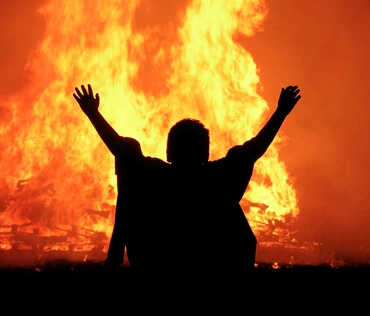1
OR nell’anno nono, del decimo mese, nel decimo giorno del mese, la parola del Signore mi fu indirizzata dicendo:
2
Figliuol d’uomo, scriviti il nome di questo giorno, di questo stesso giorno; il re di Babilonia si è posto sopra Gerusalemme questo stesso giorno.
3
E proponi una parabola a questa casa ribelle, e di’ loro: Così ha detto il Signore Iddio: Metti la pignatta al fuoco; mettivela ed anche versavi dentro dell’acqua.
4
Raccogli i suoi pezzi di carne dentro di essa, ogni buon pezzo, coscia, e spalla; empila della scelta delle ossa.
5
Prendi delle migliori bestie della greggia, e anche disponi le ossa nel fondo di essa; falla bollire a gran bollori, e sieno anche le sue ossa cotte dentro di essa.
6
Perciò, così ha detto il Signore Iddio: Guai alla città di sangue, alla pignatta, che ha dentro di sè la sua bruttura, la cui bruttura non è uscita fuori! vuotala a pezzo a pezzo; non traggasi la sorte sopra essa.
7
Conciossiachè il suo sangue sia stato in mezzo di lei; essa l’ha posto sopra un sasso liscio, non l’ha sparso in terra, per coprirlo di polvere.
8
Io altresì, montando in ira, per far vendetta, metterò il suo sangue sopra un sasso liscio, acciocchè non sia coperto.
9
Perciò, così ha detto il Signore Iddio: Guai alla città di sangue! anch’io farò una grande stipa;
10
mettendovi legne assai, accendendo il fuoco, e facendo consumar la carne, e riducendola ad esser come una composizione di odori; talchè anche le ossa saranno arse.
11
Poi facendola star vuota sopra le sue brace; acciocchè si riscaldi, e sia bruciato il suo rame, e che la sua bruttura sia strutta in mezzo di essa, e che la sua schiuma sia consumata.
12
Ella si è affaticata intorno a cose vane, e la sua grossa schiuma non è uscita fuor di lei; la sua schiuma non è uscita per lo fuoco.
13
Vi è scelleratezza nella tua immondizia; perciocchè io ti avea nettata, e tu non sei stata netta; tu non sarai più nettata della tua immondizia, finchè io abbia acquetata l’ira mia sopra te.
14
Io, il Signore, ho parlato; la cosa avverrà, ed io l’eseguirò; io non la rivocherò, e non risparmierò, e non mi pentirò. Coloro ti giudicheranno secondo le tue vie, e secondo i tuoi fatti, dice il Signore Iddio.
15
La parola del Signore mi fu ancora indirizzata, dicendo:
16
Figliuol d’uomo, ecco, io ti tolgo il desio de’ tuoi occhi, per una piaga; e tu, non farne cordoglio, e non piangerne, e non ispanderne lagrime.
17
Rimanti di sospirare, non far duolo di morto; legati la tua tiara in sul capo, e mettiti le tue scarpe ne’ piedi, e non velarti il labbro disopra, e non mangiare il pan delle persone afflitte.
18
Io parlai adunque la mattina al popolo, e la sera la mia moglie morì; e la mattina seguente feci come mi era stato comandato.
19
E il popolo mi disse: Non ci dichiarerai tu ciò che ci significano queste cose che tu fai?
20
Ed io risposi loro: La parola del Signore mi è stata indirizzata, dicendo:
21
Di’ alla casa d’Israele: Così ha detto il Signore Iddio: Ecco, io profano il mio santuario, la magnificenza della vostra forza, il desio degli occhi vostri, e la tenerezza delle anime vostre; e i vostri figliuoli, e le vostre figliuole, che voi avete lasciate, caderanno per la spada.
22
E voi farete come ho fatto io; voi non vi velerete il labbro di sopra, e non mangerete il pane delle persone afflitte;
23
ed avrete le vostre tiare in su la testa, e le vostre scarpe ne’ piedi; non farete cordoglio, e non piangerete; ma vi struggerete per le vostre iniquità, e gemerete l’un con l’altro.
24
Ed Ezechiele vi sarà per segno; voi farete del tutto come egli ha fatto; quando ciò sarà avvenuto, voi conoscerete che io sono il Signore Iddio.
25
E quant’è a te, figliuol d’uomo, nel giorno che io torrò loro la lor forza, la gioia della lor gloria, il desio degli occhi loro, e l’intento delle anime loro, i lor figliuoli, e le lor figliuole;
26
in quel giorno, colui che sarà scampato non verrà egli a te, per fartene saper le novelle?
27
In quel giorno la bocca tua ti sarà aperta, per parlar con colui che sarà scampato, e tu parlerai, e non sarai più mutolo, e sarai loro per segno; ed essi conosceranno che io sono il Signore.







